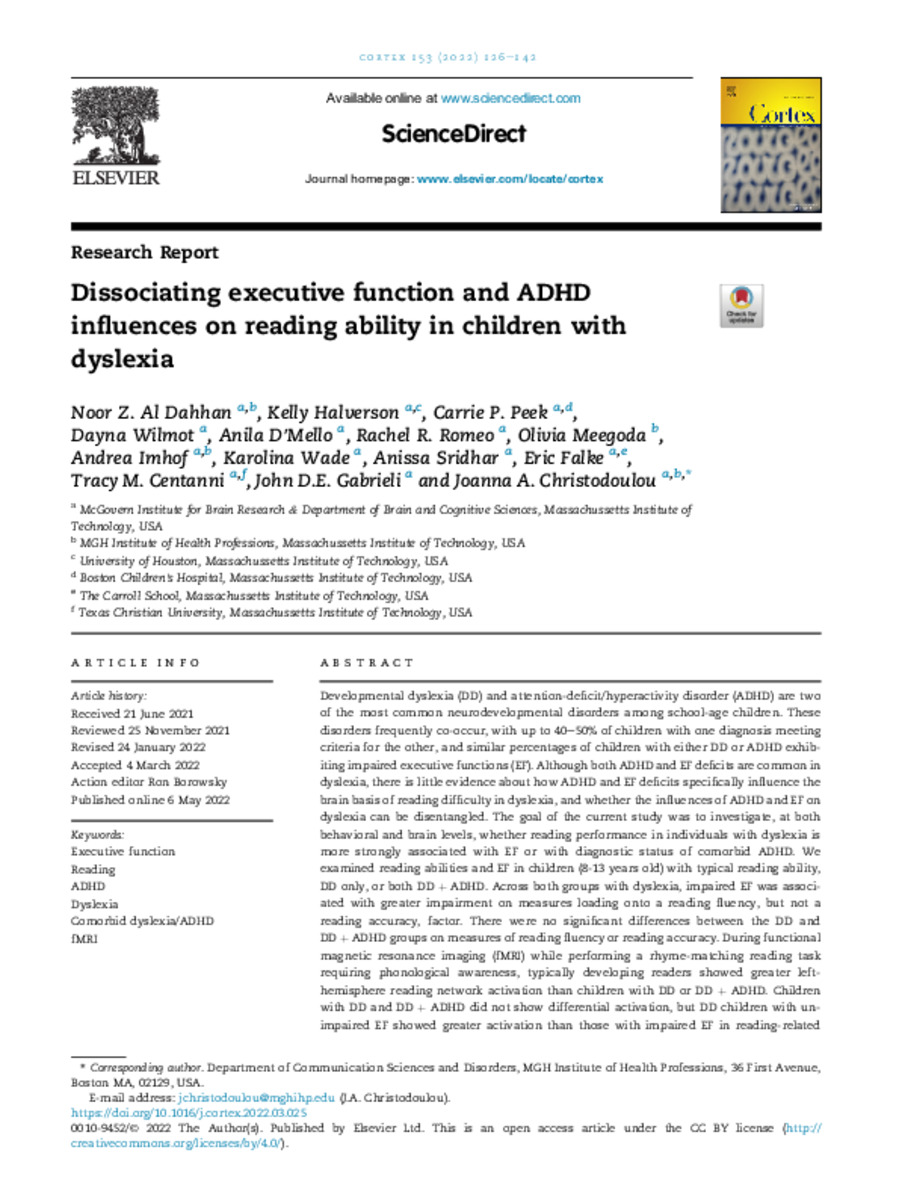Dissociating executive function and ADHD influences on reading ability in children with dyslexiaShow full item record
| Title | Dissociating executive function and ADHD influences on reading ability in children with dyslexia |
|---|---|
| Author | Al Dahhan, Noor Z.; Halverson, Kelly; Peek, Carrie P.; Wilmot, Dayna; D'Mello, Anila; Romeo, Rachel R.; Meegoda, Olivia; Imhof, Andrea; Wade, Karolina; Sridhar, Anissa; Falke, Eric; Centanni, Tracy M.; Gabrieli, John D.E.; Christodoulou, Joanna A. |
| Date | 2022 |
| Abstract | Developmental dyslexia (DD) and attention-deficit/hyperactivity disorder (ADHD) are two of the most common neurodevelopmental disorders among school-age children. These disorders frequently co-occur, with up to 40–50% of children with one diagnosis meeting criteria for the other, and similar percentages of children with either DD or ADHD exhibiting impaired executive functions (EF). Although both ADHD and EF deficits are common in dyslexia, there is little evidence about how ADHD and EF deficits specifically influence the brain basis of reading difficulty in dyslexia, and whether the influences of ADHD and EF on dyslexia can be disentangled. The goal of the current study was to investigate, at both behavioral and brain levels, whether reading performance in individuals with dyslexia is more strongly associated with EF or with diagnostic status of comorbid ADHD. We examined reading abilities and EF in children (8-13 years old) with typical reading ability, DD only, or both DD + ADHD. Across both groups with dyslexia, impaired EF was associated with greater impairment on measures loading onto a reading fluency, but not a reading accuracy, factor. There were no significant differences between the DD and DD + ADHD groups on measures of reading fluency or reading accuracy. During functional magnetic resonance imaging (fMRI) while performing a rhyme-matching reading task requiring phonological awareness, typically developing readers showed greater left-hemisphere reading network activation than children with DD or DD + ADHD. Children with DD and DD + ADHD did not show differential activation, but DD children with unimpaired EF showed greater activation than those with impaired EF in reading-related areas. Thus, ADHD status alone had no measurable influence on reading performance or brain activation. Impaired EF in dyslexia, independent of ADHD status, was associated with greater deficits in reading fluency and greater reductions of activation in response to print in the typical left-hemisphere reading network. |
| Link | https://doi.org/10.1016/j.cortex.2022.03.025
https://repository.tcu.edu/handle/116099117/56968 |
| Department | Psychology Institute of Behavioral Research |
| Subject | Executive function
Reading ADHD Dyslexia Comorbid dyslexia/ADHD fMRI |
Files in this item
This item appears in the following Collection(s)
- Research Publications [1008]
Related items
Showing a few items related by title, author, creator and subject.
-
Rapid visual processing deficits in children with dyslexia
Crossnoe, Remington (2022)Developmental Dyslexia (DD) is a heritable disorder that affects approximately 5-12% of children (Shaywitz et al, 1990) and persists in 4-6% of adults (Schulte-Korne & Remschmidt, 2003). In those with dyslexia, reading ... -
The Effect of Dyslexia Gene DCDC2 Knockout on Performance During a Prediction Task in Rats
Thorne, Abby (2020)Dyslexia is a prevalent developmental disorder characterized by unexpected reading difficulty in children and adults with otherwise normal nonverbal IQ. Dyslexia is a heterogeneous disorder and a variety of deficits are ... -
Increased variability of stimulus-driven cortical responses is associated with genetic variability in children with and without dyslexia
Centanni, Tracy M.; Pantazis, D.; Truong, D. T.; Gruen, J. R.; Gabrieli, John D. E.; Hogan, T. P. (2018-11-01)Individuals with dyslexia exhibit increased brainstem variability in response to sound. It is unknown as to whether increased variability extends to neocortical regions associated with audition and reading, extends to ...
© TCU Library 2015 | Contact Special Collections |
HTML Sitemap






